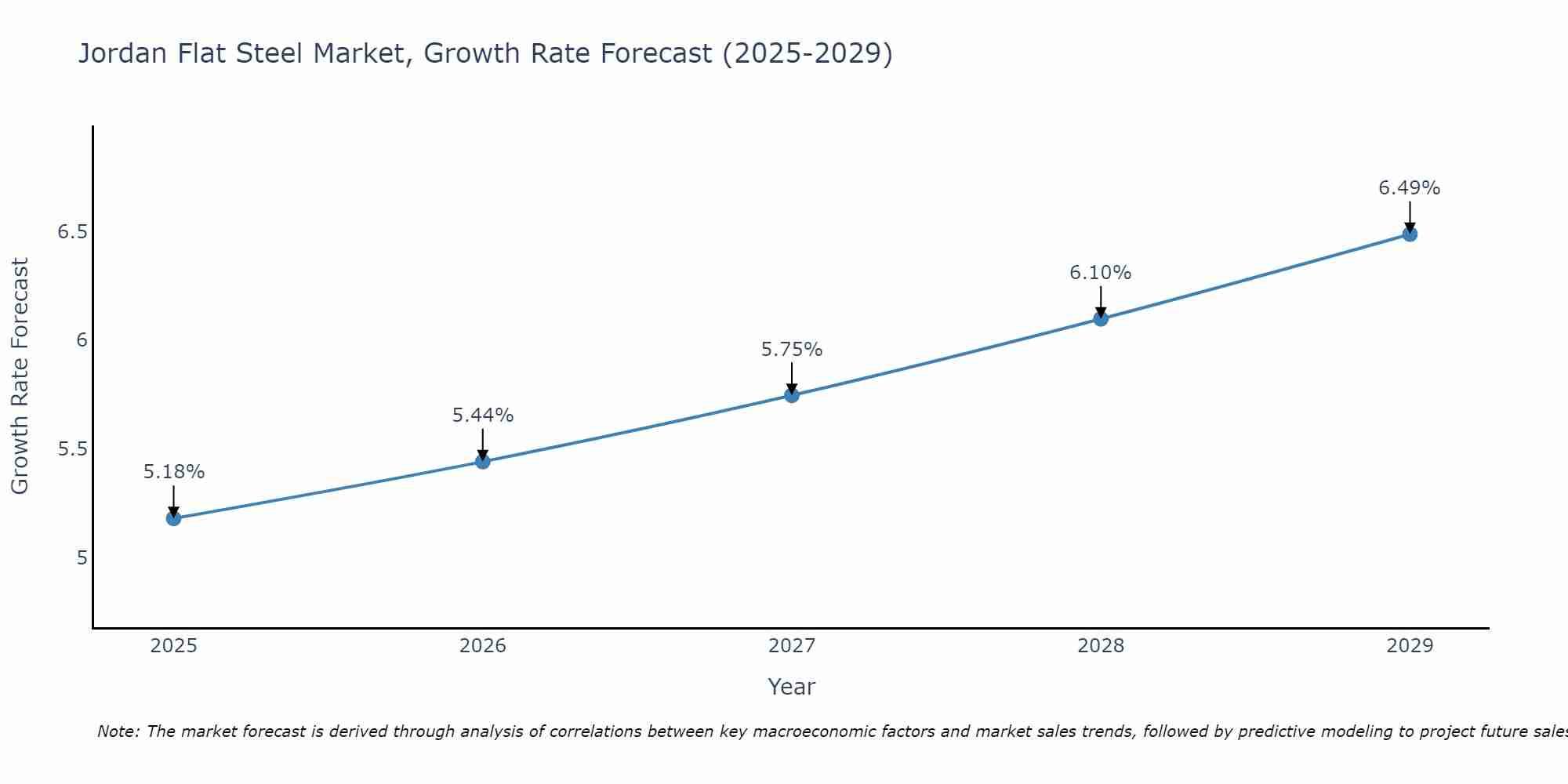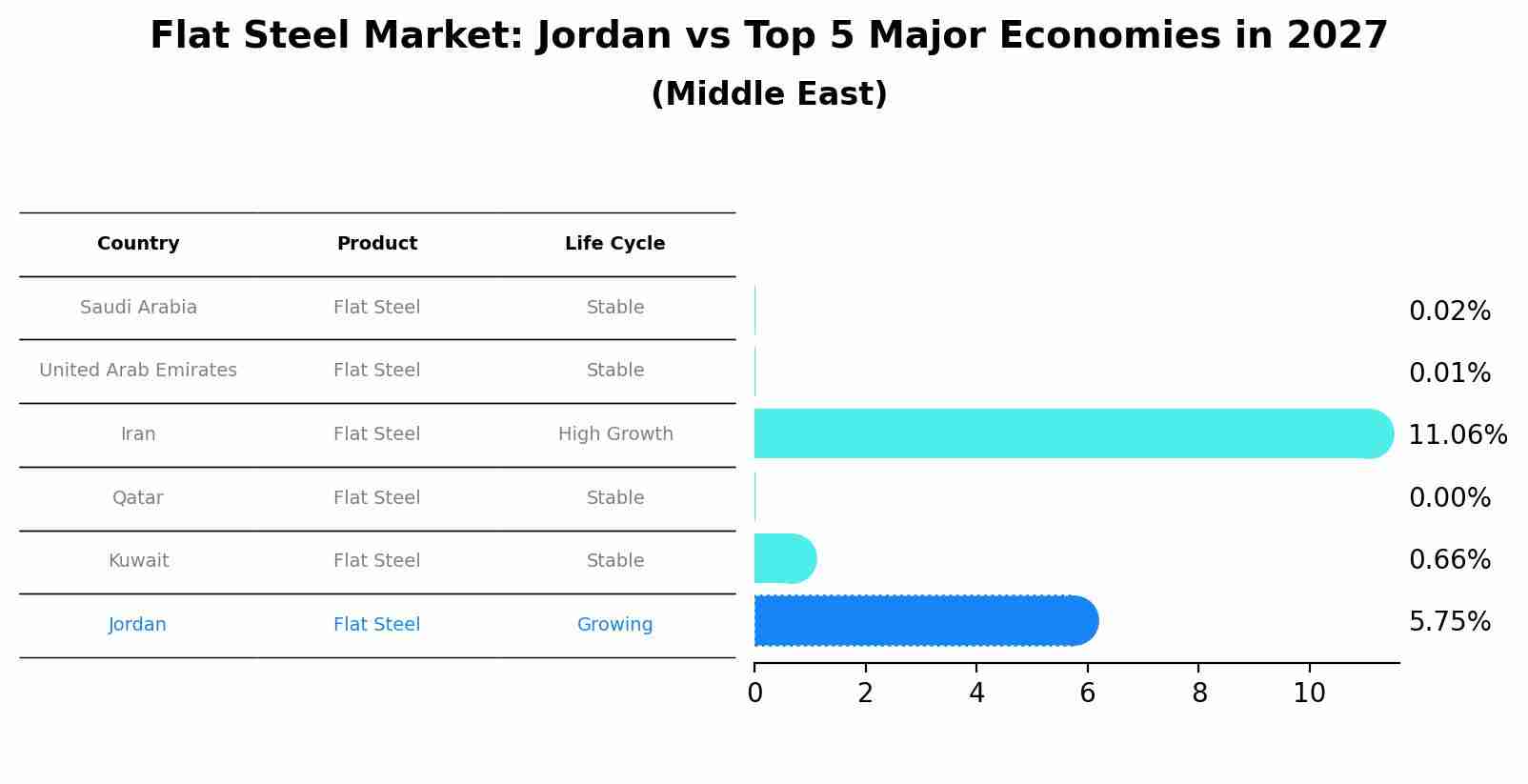Jordan Flat Steel Market (2025-2031) Outlook | Revenue, Trends, Industry, Companies, Forecast, Size, Growth, Value, Share & Analysis
| Product Code: ETC356746 | Publication Date: Aug 2022 | Updated Date: Aug 2025 | Product Type: Market Research Report | |
| Publisher: 6Wresearch | Author: Vasudha | No. of Pages: 75 | No. of Figures: 35 | No. of Tables: 20 |
Jordan Flat Steel Market Size Growth Rate
The Jordan Flat Steel Market is likely to experience consistent growth rate gains over the period 2025 to 2029. Commencing at 5.18% in 2025, growth builds up to 6.49% by 2029.

Flat Steel Market: Jordan vs Top 5 Major Economies in 2027 (Middle East)
By 2027, Jordan's Flat Steel market is forecasted to achieve a growing growth rate of 5.75%, with Saudi Arabia leading the Middle East region, followed by United Arab Emirates, Iran, Qatar and Kuwait.

Jordan Flat Steel Market Synopsis
The Jordan flat steel market is witnessing steady growth driven by increasing construction activities, infrastructure development, and manufacturing industries in the country. The demand for flat steel products such as sheets and plates is rising due to their versatile applications in various sectors including automotive, energy, and consumer goods. Key players in the market are focusing on product innovation, technological advancements, and strategic partnerships to gain a competitive edge. The market is also influenced by factors such as fluctuating raw material prices, government regulations, and global economic conditions. Overall, the Jordan flat steel market is expected to continue its growth trajectory in the coming years, presenting opportunities for both domestic and international steel manufacturers.
Jordan Flat Steel Market Trends
The Jordan flat steel market is experiencing a shift towards sustainability and innovation. With a growing focus on environmental concerns, there is a increasing demand for eco-friendly steel production processes and materials. Additionally, technological advancements such as automation and digitalization are being adopted by key players in the market to improve efficiency and reduce costs. The construction sector remains a major driver of demand for flat steel products in Jordan, particularly for infrastructure and residential projects. Moreover, the market is witnessing a trend towards customization and specialization to meet the specific requirements of different industries. Overall, the Jordan flat steel market is evolving towards greener practices, advanced technologies, and tailored solutions to cater to the changing needs of customers and the industry.
Jordan Flat Steel Market Challenges
In the Jordan Flat Steel Market, some challenges faced include fluctuations in raw material prices, intense competition from imports, and the impact of global economic conditions on local demand. The market is also influenced by regulatory changes and trade policies that can affect the pricing and availability of flat steel products. Additionally, infrastructure limitations and logistical constraints may pose challenges for domestic producers in terms of distribution and reaching customers efficiently. Overall, the Jordan Flat Steel Market must navigate these challenges while also focusing on enhancing product quality, innovation, and market positioning to remain competitive in both domestic and international markets.
Jordan Flat Steel Market Investment Opportunities
In the Jordan flat steel market, several investment opportunities are present due to the country`s growing construction, automotive, and manufacturing industries. With increasing infrastructure projects and construction activities, there is a demand for flat steel products such as sheets, coils, and plates. Investors can consider opportunities in establishing or expanding flat steel manufacturing facilities to cater to the local market`s needs. Additionally, investing in distribution channels and logistics infrastructure can also be lucrative as it can help in efficiently supplying flat steel products to various industries. Furthermore, technological advancements and innovations in the production processes can enhance competitiveness and profitability in the market. Overall, the Jordan flat steel market offers promising investment prospects for those looking to capitalize on the country`s industrial growth and development.
Jordan Agar Market Government Policies
The Jordanian government has implemented various policies related to the flat steel market to support domestic production and protect local industries. These policies include import tariffs on flat steel products to reduce competition from foreign imports and promote the growth of local manufacturers. Additionally, the government has provided incentives such as tax breaks and subsidies to encourage investments in the flat steel sector, aiming to enhance the country`s self-sufficiency and create more job opportunities. Furthermore, regulations are in place to ensure quality standards and environmental compliance in the production processes, promoting sustainable development in the industry. Overall, the government`s policies in the Jordan flat steel market focus on fostering a competitive and sustainable domestic market while safeguarding the interests of local producers.
Jordan Flat Steel Market Future Outlook
The future outlook for the Jordan Flat Steel Market appears positive, driven by increasing infrastructure projects, construction activities, and industrial development in the country. The demand for flat steel products is expected to grow steadily, supported by sectors such as automotive, manufacturing, and energy. Government initiatives to boost domestic production and reduce reliance on imports are likely to further stimulate market growth. Additionally, advancements in technology, such as automation and digitalization, are anticipated to enhance production efficiency and drive innovation in the flat steel industry. Overall, the Jordan Flat Steel Market is poised for expansion in the coming years, presenting opportunities for market players to capitalize on the growing demand and evolving landscape.
Key Highlights of the Report:
- Jordan Flat Steel Market Outlook
- Market Size of Jordan Flat Steel Market, 2024
- Forecast of Jordan Flat Steel Market, 2031
- Historical Data and Forecast of Jordan Flat Steel Revenues & Volume for the Period 2021 - 2031
- Jordan Flat Steel Market Trend Evolution
- Jordan Flat Steel Market Drivers and Challenges
- Jordan Flat Steel Price Trends
- Jordan Flat Steel Porter's Five Forces
- Jordan Flat Steel Industry Life Cycle
- Historical Data and Forecast of Jordan Flat Steel Market Revenues & Volume By process for the Period 2021 - 2031
- Historical Data and Forecast of Jordan Flat Steel Market Revenues & Volume By Basic Oxygen Furnace for the Period 2021 - 2031
- Historical Data and Forecast of Jordan Flat Steel Market Revenues & Volume By Electric Arc Furnace for the Period 2021 - 2031
- Historical Data and Forecast of Jordan Flat Steel Market Revenues & Volume By type for the Period 2021 - 2031
- Historical Data and Forecast of Jordan Flat Steel Market Revenues & Volume By Sheets & Strips for the Period 2021 - 2031
- Historical Data and Forecast of Jordan Flat Steel Market Revenues & Volume By Plates for the Period 2021 - 2031
- Historical Data and Forecast of Jordan Flat Steel Market Revenues & Volume By end-use sector for the Period 2021 - 2031
- Historical Data and Forecast of Jordan Flat Steel Market Revenues & Volume By Building & Infrastructure for the Period 2021 - 2031
- Historical Data and Forecast of Jordan Flat Steel Market Revenues & Volume By Mechanical Equipment for the Period 2021 - 2031
- Historical Data and Forecast of Jordan Flat Steel Market Revenues & Volume By Automotive & Other Transport for the Period 2021 - 2031
- Historical Data and Forecast of Jordan Flat Steel Market Revenues & Volume By Others for the Period 2021 - 2031
- Jordan Flat Steel Import Export Trade Statistics
- Market Opportunity Assessment By process
- Market Opportunity Assessment By type
- Market Opportunity Assessment By end-use sector
- Jordan Flat Steel Top Companies Market Share
- Jordan Flat Steel Competitive Benchmarking By Technical and Operational Parameters
- Jordan Flat Steel Company Profiles
- Jordan Flat Steel Key Strategic Recommendations
Frequently Asked Questions About the Market Study (FAQs):
- Single User License$ 1,995
- Department License$ 2,400
- Site License$ 3,120
- Global License$ 3,795
Search
Related Reports
- Australia IT Asset Disposal Market (2025-2031) | Strategy, Consumer Insights, Analysis, Investment Trends, Opportunities, Growth, Size, Share, Industry, Revenue, Segments, Value, Segmentation, Supply, Forecast, Restraints, Outlook, Competition, Drivers, Trends, Demand, Pricing Analysis, Competitive, Strategic Insights, Companies, Challenges
- UAE Building Thermal Insulation Market Outlook (2025-2031) | Revenue, Companies, Share, Trends, Growth, Size, Forecast, Industry, Analysis & Value
- Portugal Electronic Document Management Market (2025-2031) | Strategy, Consumer Insights, Analysis, Investment Trends, Opportunities, Growth, Size, Share, Industry, Revenue, Segments, Value, Segmentation, Supply, Forecast, Restraints, Outlook, Competition, Drivers, Trends, Demand, Pricing Analysis, Competitive, Strategic Insights, Companies, Challenges
- France Electronic Document Management Market (2025-2031) | Strategy, Consumer Insights, Analysis, Investment Trends, Opportunities, Growth, Size, Share, Industry, Revenue, Segments, Value, Segmentation, Supply, Forecast, Restraints, Outlook, Competition, Drivers, Trends, Demand, Pricing Analysis, Competitive, Strategic Insights, Companies, Challenges
- Portugal Occupational Health & Safety Services Market (2025-2031) | Strategy, Consumer Insights, Analysis, Investment Trends, Opportunities, Growth, Size, Share, Industry, Revenue, Segments, Value, Segmentation, Supply, Forecast, Restraints, Outlook, Competition, Drivers, Trends, Demand, Pricing Analysis, Competitive, Strategic Insights, Companies, Challenges
- Netherlands Occupational Health and Safety Services Market (2025-2031) | Strategy, Consumer Insights, Analysis, Investment Trends, Opportunities, Growth, Size, Share, Industry, Revenue, Segments, Value, Segmentation, Supply, Forecast, Restraints, Outlook, Competition, Drivers, Trends, Demand, Pricing Analysis, Competitive, Strategic Insights, Companies, Challenges
- Belgium and Luxembourg Facility Management Market (2025-2031) | Strategy, Consumer Insights, Analysis, Investment Trends, Opportunities, Growth, Size, Share, Industry, Revenue, Segments, Value, Segmentation, Supply, Forecast, Restraints, Outlook, Competition, Drivers, Trends, Demand, Pricing Analysis, Competitive, Strategic Insights, Companies, Challenges
- Russia Women Intimate Apparel Market (2025-2031) | Strategy, Consumer Insights, Analysis, Investment Trends, Opportunities, Growth, Size, Share, Industry, Revenue, Segments, Value, Segmentation, Supply, Forecast, Restraints, Outlook, Competition, Drivers, Trends, Demand, Pricing Analysis, Competitive, Strategic Insights, Companies, Challenges
- Africa Chocolate Market (2025-2031) | Size, Share, Trends, Growth, Revenue, Analysis, Forecast, industry & Outlook
- Global Hydroxychloroquine And Chloroquine Market (2025-2031) | Industry, Trends, Size, Outlook, Growth, Value, Companies, Revenue, Analysis, Share, Forecast
Industry Events and Analyst Meet
Our Clients
Whitepaper
- Middle East & Africa Commercial Security Market Click here to view more.
- Middle East & Africa Fire Safety Systems & Equipment Market Click here to view more.
- GCC Drone Market Click here to view more.
- Middle East Lighting Fixture Market Click here to view more.
- GCC Physical & Perimeter Security Market Click here to view more.
6WResearch In News
- Doha a strategic location for EV manufacturing hub: IPA Qatar
- Demand for luxury TVs surging in the GCC, says Samsung
- Empowering Growth: The Thriving Journey of Bangladesh’s Cable Industry
- Demand for luxury TVs surging in the GCC, says Samsung
- Video call with a traditional healer? Once unthinkable, it’s now common in South Africa
- Intelligent Buildings To Smooth GCC’s Path To Net Zero













